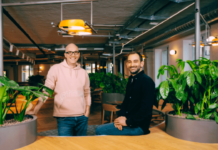In a bold move to transform the European food system, Amsterdam-based grocery app Crisp has recently raised €35 million in funding. This significant financial boost is set to propel their mission of delivering better, more sustainable food to the masses. Crisp, known for its focus on seasonal and local produce, has garnered the support of both existing and new investors, including prominent Dutch entrepreneurs and family funds.
Among the supporting investors are some of the most successful operators in the market, including Adriaan Mol of Mollie and Messagebird, John Caspers of Adyen, Sanne Manders of Flexport, and Thomas Plantenga of Vinted. The round also includes seasoned retail executives like Sander van der Laan, formerly of Ahold, Action, and Douglas, and family offices such as Bookmakers Investments, Timeless Investments, and Strikwerda Investments. Venture capital firms Keen Ventures and Target Global have also reinvested in this round.
Despite a challenging industry landscape marked by limited growth, Crisp has been achieving a remarkable 30% sales growth with significantly improved margins. Since its launch in 2018, the fresh grocery app has been on a rapid ascent, turning profitable at the order level by 2020. Crisp is on track to reach break-even before the upcoming summer in the Netherlands.
Tom Peeters, co-founder and CEO of Crisp, expressed pride in this achievement, especially given the current turbulent tech climate and economy. He highlighted Crisp’s ability to stay on course with a healthy product and business model as key to securing investor confidence.
Crisp aims to use the fresh funding to build a better food system. With a fully proprietary software and operations system tailored for local and seasonal products, Crisp facilitates the shortest route from farm to fork. The app allows customers nationwide to shop from over 900 small-scale suppliers, demonstrating that circularity, zero waste, and responsible farming can be integral to mass market operations. To further amplify its positive impact, Crisp is on the verge of becoming fully carbon neutral and has submitted its application to become a certified B Corp.
Building a better food system is a challenge for our generation, as Peeters points out. The B Corp certification, an independent label assessing strict sustainability criteria, is a step towards institutionalizing sustainability in Crisp’s operations.
In contrast to the broader market sentiment, Crisp recognizes that growing consumer consciousness can lead to a sustainable and profitable business model. Even as the broader online market experiences stagnation or decline in certain segments, Crisp continues to grow at an impressive rate. This growth is supported by a unique market offering, high customer loyalty, and significantly higher margins.
In conclusion, Crisp’s latest funding round is a testament to the potential of sustainable and eco-friendly business models in today’s economy. By focusing on local and seasonal produce, zero waste, and responsible farming, Crisp is setting a new standard for online supermarkets. As Crisp moves towards B Corp certification and carbon-neutral operations, it stands as a beacon of innovation in the European startup landscape, demonstrating that ethical business practices can go hand-in-hand with financial success and market growth.





